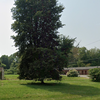Judge upholds dump decision
Deferring to DEC
The watchdog group Save the Pine Bush, which celebrated its 32nd anniversary on Sunday, has lost its case against the City of Albany over the fifth expansion of the Rapp Road landfill.
Save the Pine Bush, led by one of its founders, Lynne Jackson, has long fought to preserve the pine barrens ecosystem, and, when the state’s Department of Environmental Conservation approved the most recent expansion, the group raised objections.
“Every time the city has expanded the landfill, they have promised it is the last time,” said Jackson in December. “Their promises are meaningless.”
On Feb. 5, Supreme Court Justice Patrick J. McGrath handed down the decision to dismiss Save the Pine Bush’s petition.
“All of the substantive causes of action of the petition have been found to be without merit,” reads the court document.
Asked if Save the Pine Bush would appeal the Feb. 5 decision, Jackson said she could not comment on future litigation, “but there are two other courts out there,” she said.
The Supreme Court, the lowest rung in a three-tiered system, heard oral arguments from Save the Pine Bush, the City of Albany, and the DEC on Dec. 11, and Peter Henner, the Clarksville lawyer representing the watchdog group, presented three main arguments.
Henner said the city had no solid waste plan in place; the DEC did not hold an adjuticatory hearing on the matter before the expansion permit was granted; and, the DEC did not comply with the State Environment Quality Review Act, which stipulates the identification of relevant areas of environmental concern.
The DEC argued that long-term solid waste plans were not mandatory, according to Article 27 of the Environmental Conservation; as a condition for granting the expansion permit, the DEC has required the city to formulate a long-term plan by 2011.
“The unique circumstances of this case indicate that it was reasonable to approve a solid waste management plan which did not resolve all issues and which required the City to submit a plan which fully addressed all of the issues within 1 1⁄2 years,” McGrath’s decision reads.
In the matter of the adjuticatory hearing, the DEC said that Save the Pine Bush had not raised significant issues regarding its permit application, and therefore it had no reason to hold a hearing.
“The principal of requiring a showing of a triable issue of fact before being entitled to a hearing is very familiar to the judiciary…It is therefore determined that the determination not to hold an adjuticatory hearing was neither arbitrary nor capricious nor was it contrary to law,” McGrath decided.
In response to Save the Pine Bush’s assertion that the DEC did not comply with SEQRA because it did not consider alternatives to the expansion, did not mitigate environmental impacts, did not consider odor problems, and failed to examine impact to the Pine Bush ecosystem, the DEC argued that it had considered five alternatives to the expansion. The DEC also cited its $18 million habitat restoration plan as an in-depth study on the environmental impacts of the landfill expansion, as well as a way to alleviate them.
“The permits contain a number of special conditions intended to mitigate the impacts of operating the landfill in this sensitive area…going significantly beyond normal landfill closure requirements by covering the closed landfill with additional cover designed to foster and encourage pine bush species…” reads the decision rendered by McGrath.
It always says, “This Court may not substitute its judgment for the determinations of DEC…Moreover, the permits and license herein clearly involve technical expertise, and, as such, the determinations are entitled to great deference.”
“The court has simply lost its mind,” was Jackson’s reaction to the decision. “Basically the court is telling Save the Pine Bush that whatever the DEC says, goes,” she told The Enterprise yesterday.
Lawyers for the DEC could not be reached for comment yesterday.
Jackson said she was particularly outraged over the idea that the City of Albany is more concerned with profiting from the landfill than with the preservation of environmentally sensitive land and the health and safety of residents living near the dump.
“The citizens are basically paying to subsidize these private corporations,” Jackson said, referring to the $10 per ton tipping fee that she said will go toward paying for the multi-million-dollar habitat restoration plan detailed in the DEC’s Final Environmental Impact Statement, but Jackson said she would use the word “restoration” loosely.
Permit variances obtained by the DEC allow the use of “Posi Shell,” a spray-on material that will act as an intermediate cover on the landfill instead of the compacted soil normally required by state law. Members of Save the Pine Bush say capping the landfill does not constitute true restoration.
“Right now, the courts are on the side of the corporations, not justice,” said Jackson. “We presented substantive issues that needed to be looked at. We should have won.”


